As an Amazon Associate I earn from qualifying purchases.
Pulpo a la gallega. Man, is this good! I can’t tell you when I first ate this Spanish classic, but it was probably sometime in my late teens, and probably at a Spanish restaurant on New Jersey’s Route 22 whose name escapes me now. But I remember it being real-deal Spanish — or at least what I imagined it might be, considering I’ve never been there.
Pulpo a la gallega is basically an octopus salad. Most octo-eating cultures have their versions, and the Spaniards are no different.
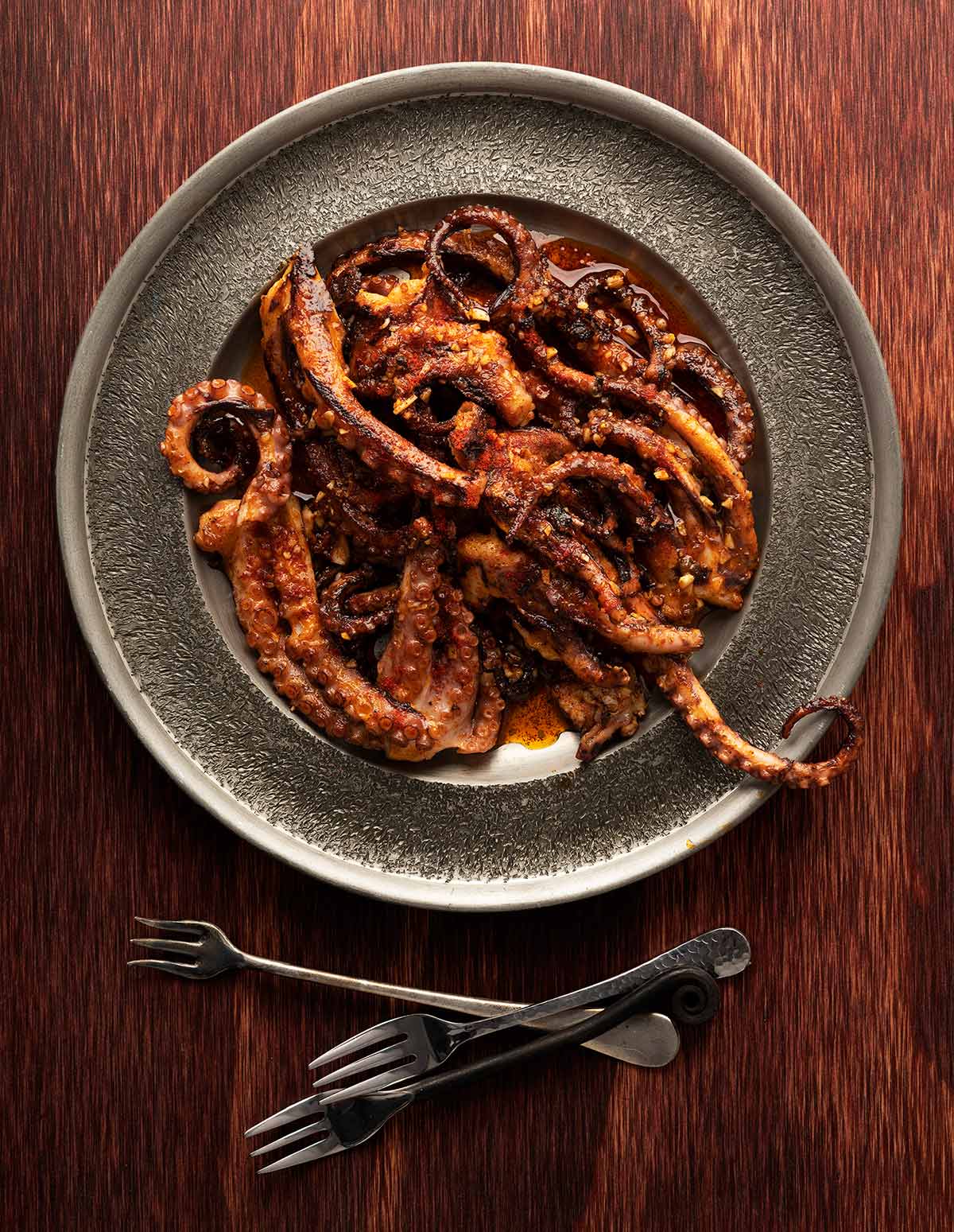
According to the late, great cookbook author Penelope Casas in her The Foods and Wines of Spain, “a la gallega” is from Galicia, and it means anything cooked with paprika and olive oil… to my mind, everything is good with paprika and olive oil, but octopus is especially good.
You will also find this recipe called pulpo a la feria, because it is common festival, or fair, food in Spain.
And while most octopus salads are summertime fare, pulpo a la gallega works in any weather, likely because Galicia is in the cold, northern part of Spain. I think it’s the paprika and garlic that gives you a warming feeling when you eat it.
And while yes, I often finish the octopus on the grill, I do live in California, where this is easily done all year. You can either grill or use the broiler — the point is to get a little char on the octopus. If you use the broiler, keep an eye on things because while a little char is good, a lot will ruin the dish.
(I also have a straight-up grilled octopus recipe.)
Once the octopus is ready, you toss is in olive oil with paprika, a little cayenne, salt and black pepper and squeeze lemon juice or sherry vinegar on it.
Pulpo a la gallega is a perfect tapas dish, party appetizer or hell, just something to chew on with crusty bread while watching football. If you want to make this part of a cool Spanish tapas feast, I’d whip up some salt cod fritters to go alongside it, as well as boquerones and maybe even quail or partridges en escabeche.
Pulpo a la Gallega, Spanish Octopus with Paprika
Ingredients
- 2 to 3 pounds octopus
- 1 bunch of parsley
- Tops from a fennel bulb
- 1 sprig oregano
- 2 to 3 green onions, chopped roughly
- 2 bay leaves
- 4 garlic cloves, crushed and minced
- 1/2 cup extra-virgin olive oil
- 1 tablespoon paprika
- 1 teaspoon smoked paprika (optional)
- 1/4 teaspoon cayenne
- Salt and black pepper
- Lemon wedges to serve
Instructions
- First you'll need to tenderize the octopus. Boil a large pot of salty water. Cook the octopus for 2 minutes, then remove to a cutting board. While the octos are cooling turn the oven to 225°F.
- Line a heavy, lidded pot with the parsley, fennel fronds, oregano, green onions and bay leaves. Trim fatty bits from the octopus and clean out the heads (normally this last step has been done for you, but not always). Cut the octopi into large pieces and nestle into the pot of greens. Cover the pot and cook for 90 minutes to 4 hours, depending on how large and tough the octopi are. I typically shoot for 2 hours. Don't worry about the lack of liquid in the pot: The octos will release enough to make a flavorful broth.
- When the octopus is tender, remove from the pot and cut into serving-sized pieces. Coat with some of the olive oil and either grill or broil until you get some char marks, about 8 to 10 minutes.
- Toss the octopus with the rest of the olive oil, garlic, the paprika, smoked paprika and cayenne. Add salt and black pepper to taste and serve with lemon wedges, at room temperature or slightly warm. Serve with bread.
Nutrition
Nutrition information is automatically calculated, so should only be used as an approximation.
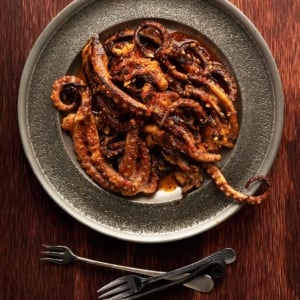
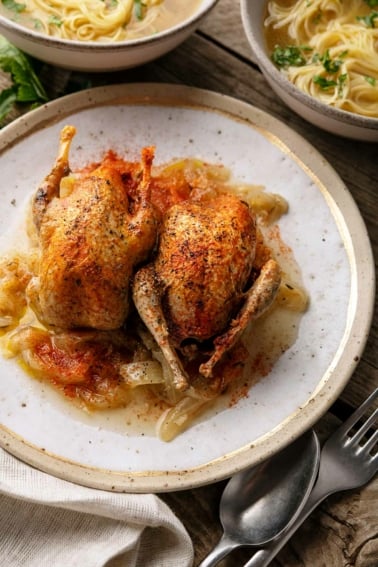
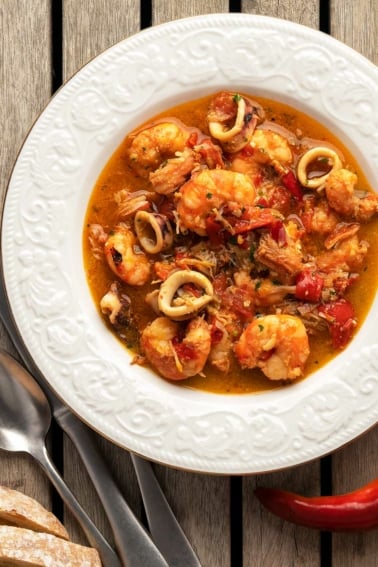
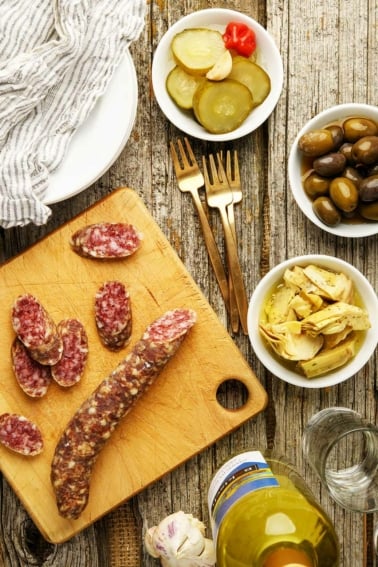
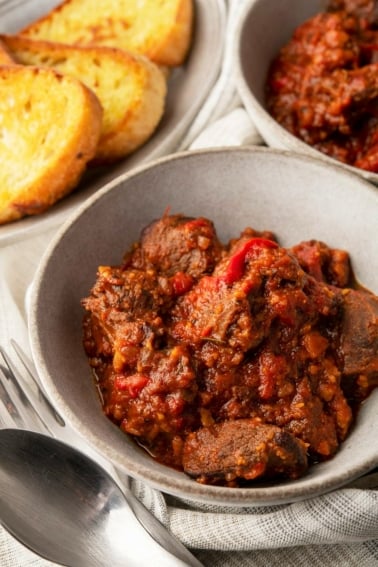
Apparently the freezing achieves the same as the beating against the rock (my first occy experience in Greece as well) or prolonged boiling….something to do with breaking down enzymes (?) to make the flesh tender.
A good tenderising tip / recipie
Freeze the octopus for a couple of weeks.
Boil with onion and a few Bay leaves for 30 to 45 mins
Either complete the above recipie or……cut into slices, mix in paprika and then pour very hot olive oil over.
serve with crusty bread while still sizzling….
My favourite recipe till now, looking forward to trying the grill option above though!
I purchased some pre-cooked sliced octopus at a Korean market in my area this morning. Can I just start the recipe at the toss in olive oil and grill, etc? Or should I marinate it with some garlic and olive oil with bay leaf overnight then start with the grilling…?
Patrice: Sorry, no idea. You’ll have to experiment.
Hi, do u use fresh or dried bay leaves? Thanks!
Jewelz: Either, but normally dried.
I was looking for a pulpo gallego recipe and hit upon yours. I laughed out loud when you wrote, “some spanish restaurant on Route 22 in New Jersey.” Wouldn’t happen to be the Spanish Tavern in Mountainside would it???
Actually… I think it is!!!
Looking forward to this, why though do you cut up the octo here for braising and for your Greek Version leave it whole. I’m hoping to follow this, then cool the octo cut in small bits and freeze in a good house made tomato sauce; baggies of portions to be thawed for Passta, Rice or even Pizzas. I use canned octo and enjoy but figure I can make better and cheaper. We’ll let you know how it goes.
I love octopus! And I definitely agree with you – anything with paprika and olive oil is a winner in my book! This looks great =)
Recipes looks fantastic. I once watched a Greek fisherman beat the octopus with a wooden paddle to tenderize it. Must have gone at it for 10 minutes or so. Then it was cooked with red wine. Delicious.
Not much experience with octopus but it sounds a lot like abalone in its raw, 2 minutes and a few hours cooking behavior. I have difficulty getting steaks consistently soft in the very hot cast iron pan at 2 minutes (but they can be so great). My latest experiments involve a cast iron hot press to sandwich/heat it from both sides with a large consistent contact area (they curl too much otherwise).
Hank,
‘Tis true. Octos can be cooked quickly – a flash sear on a very hot grill is a favorite of mine. I don’t think Dan is mistaking polpo for calamari – his advise is dead on. It is the in-between cooking times that will yield rubber.
Also – first comment here. Love your site!
Porter
This recipe came just in time. I’m off to Fiji and I know I will buy octopus at the market. The recipe sounds delicious! Thank you!
Octopus never looked so good!
Dan: The cork thing is a myth. It really is, sorry. And I have never, ever heard of someone cooking octopus for only 2 minutes. Squid a/k/a calamari, absolutely. But never octopus. Different critter.
Matt, my wife is a wild game chef and she said putting a wine cork in the liquid cuts the tenderizing process down to about 1 1/2 hours. Not sure why the cork works, but she does this when making octopus. She said you either eat it raw, cook for two minutes or 2 hours. No in between will work.
This is so very beautiful! I eat octopus twice or thrice a week – grilled & smoked – depending on my mood, and yours is absolutely gorgeous! Thank you for this fantastic column, and with spectacular pictures! You obviously have a palate for the very magnificent things in life! Cheers! – Leah
Kris, The grill is a Lodge Sportsman Hibachi grill. Great little grill. Thanks for sharing that recipe, Hank. Looks fantastic.
That looks amazing! Did you catch the octopus yourself or is it store bought? If it is store bought what should we be looking for when buying octopus at the market?
Ay, Hank, me haces la boca agua, hombre! I fell in love with this dish (and many, many others) while living in Galicia back in the 90s. It’s still one of my all-time favorite Spanish recipes.
And I’m ashamed to say that this was the first I’d heard of the passing of doña Casas. I almost fell over when I read “late, great” in your introduction! What a loss – such a great talent. My copy of Foods & Wines is on the verge of falling apart after decades of use. Without question one of, if not the, most-used cook books in my library. Her others are also invaluable resources. Thanks for sharing.
Matt: It’s always been my experience that size is the determining factor: Large, older octos — which might be a different species — take longer to cook. Not sure about your octopus ceviche, but I bet it was cooked first.
Info on that little grill!
This looks fantastic! I’m surprised that there is so much variance in the time to get the octopus tender though. Is that purely based on the size of the animal or can its species also make a difference? My only experience with octopus was in ceviche that I had in Costa Rica: it was purple, frightening, tender and delicious. Is it possible that the octopus was only “cooked” in acid there or do you think it would be impossible to get this creature tender without prolonged cooking?